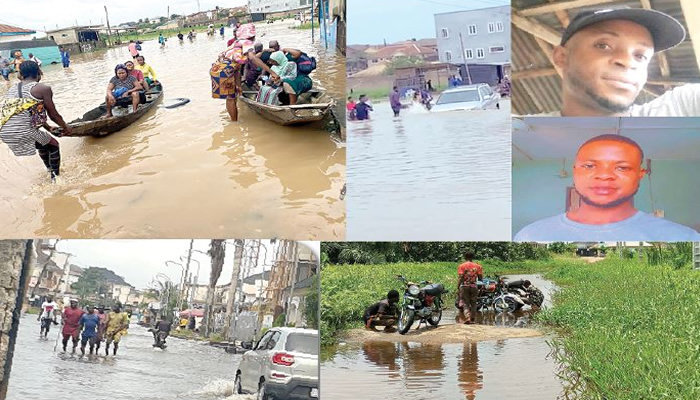
JANET OGUNDEPO reports that the predicted heavy rainfall and flooding have begun with many Nigerians already facing hardship
The downpour has started with the accompanying destruction and death. The torrential rainfall of last week appeared to be a prelude to the predicted high rainfall across the country.
Floodwater last Thursday overwhelmed communities in Arigbede, Warewa and Magboro, Ogun State, as people could not leave their homes.
Residents of both Lagos Island and Mainland, Lagos State, were not spared in the surge, as many were displaced by the rain.
Business owners and people living around Atiku Abubakar Way and its environs in Uyo, Akwa Ibom State, were also thrown into hardship after flood submerged many houses a few days ago.
Casualties have also been recorded as a man, identified as Chukwudi, who was about to wed, was killed by flood last Sunday in Enugu State.
A 10-year-old boy was also swept away by floodwater in Delta State in April.
A mother of two, Zainab Yusuf, is still looking for her husband, Najim, a 45-year-old truck driver and businessman, who was swept away by a flood in the Alakuko area of Lagos State on May 14.
During a heavy rainfall, Najim had parked his vehicle in front of a filling station in the community to get water to fix the bus.
He was trying to cross a gutter to access the station when he slipped into the drainage and was swept away by the floodwater.
Sunday PUNCH reports that many Nigerians are not aware of the prediction of heavy rains by the technical committee of experts set up by the Federal Government.
As a result, they have little to no information on the government’s directive that residents in floodplain areas should vacate.
Early warning, state alerts
A document on the 2023 climate-related disaster preparedness and mitigation strategies prepared by the committee of experts and chaired by the National Emergency Management Agency, warned that roads, bridges, major infrastructure and communities might be washed away due to the heavy rain and strong wind expected this year.
They added that the flood would lead to an outbreak of epidemics in communities, washing away farmlands and destruction of livestock.
The experts predicted an early start of rain from March in the coastal areas and July, in the hinterland with resultant flash floods.
They advised strategic placement of emergency services in disaster-prone areas and called for the relocation of communities that were perennially affected by floods to safer places.
The 2023 Flood Outlook issued by the Nigeria Hydrological Services Agency, in February, stated that 178 local governments in 32 states and the Federal Capital Territory faced the risk of flooding.
Following this, state governments began sensitising people to the coming flood.
The Anambra State Commissioner for Information, Paul Nwosu, alerted residents to the imminent flooding. This was also because in 2022, floods destroyed houses and farmlands and displaced many citizens.
The PUNCH reported that over 300 communities in Anambra were sacked last year and about a million people were displaced.
Following the predictions and warnings by the federal committee, the Ogun State Government, on April 26, alerted residents living around the 23 flood-prone areas to temporarily relocate.
A former Commissioner for the Environment, Ola Oresanya, warned residents to prepare for the flash floods that would accompany the predicted 3,646mm of rainfall between April and November.
Oresanya stated that coastal areas along the tidal lock of the Ogun River and the Lagoon would experience flooding due to a rise in sea level and the release of water from the Oyan Dam.
He said, “In preparation for the inevitable impact of the natural pattern of rainfall predicted for 2023, residents in the following areas: Onikoko, Sokori and Arakanga areas in Abeokuta; Owa and Yemule riverbanks in Ijebu-Ode; Eruwuru in Sagamu; Ebute Imobi in Ijebu East; Isaka Owode in Ado-Odo Ota; Owode, Igijo, Ilaro and Ijoko should expect flash floods due to heavy rainfall within short periods.
“The second season will have a prolonged impact in wetlands such as Alagbole, Akute, Isheri, Warewa, Oke-Afa, Mowe, Ibafo, Kara, Onihale, Ebute Kimobi and Riverside Estate.
“These areas will witness coastal flooding due to the tidal lock of the Ogun River by the Lagos Lagoon from the natural rise in sea level coupled with the possible release of excessive water from the Oyan Dam. Residents of these areas should be prepared to relocate temporarily during the second season of rainfall if required.”
Also, the Lagos State Government appealed to residents to embrace good environmental habits, saying it was taking steps to contain flooding in the state.
A former Commissioner for the Environment and Water Resources, Tunji Bello, specifically asked people in the state to stop dumping refuse in authorised places, clogging drains with silt or construction materials or erecting structures within and around drainage right of ways and setbacks.
Bello advised based on the 2023 Nimet prediction that communities and residents in coastal and low-lying wetland areas such as Agiliti, Agboyi, Itowolo ad Ajegungle, should move to upland “to avert needless loss of life and property.”
Acting on the flood prediction, the SEMA in Kogi State stated that it was taking proactive steps to prevent a repeat of the 2022 flood.
The Director of the Relief Unit, Ajibade Abimbola, said aggressive awareness “to intimate the public about the projected 2023 floods and the need for residents to relocate to high ground” was ongoing.
Yobe, one of the states adversely affected by the 2022 flood, had also been put on alert for flooding this year.
Awareness to residents, continuous monitoring of the water level in the dam and a five-year plan on flood mitigation and control were some of the ways the government listed to combat the flood.
Timely release of funds for emergency response and identification of flood-prone schools and those occupied by Internally Displaced Persons were further measures the YOSEMA highlighted to mitigate the problem.
But On May 5, YOSEMA reported the death of three people and displacement of 271 households in the Labba Kuka community in Mutai Ward of Gujba LGA, from a downpour on May 5.
Ogun communities hit by flood
On Thursday, June 8, many residents of Powerline, Oke-Afa, Gasline, Cele and Sparklight in Magboro, Ogun State, woke up to floods which overran their estate exits.
The flood, which resulted from the downpour that started on Wednesday evening, paralysed socio-economic activities in the Obafemi Owode Local Government Area of the state.
Several shops were shut down as the floods prevented cars, school buses, and motorcycles from passing through them, forcing children, women and men to stay at home.
A resident on Sparklight Estate, Chioma Azuka, a chef, told our correspondent that she cancelled her appointment with a client because of the flood.
She said, “As early as 5am on Thursday, the two entrances leading into our estate were flooded and all residents, including schoolchildren, were warned to stay indoors for their own safety. It was a high risk for even those driving cars because the water was deep.
“There was a time in 2019 that a similar flood occurred here and a man who filled gas cylinders for estate residents waded into the water on his way here but he was swept away and died.
“I had to cancel the appointment I had fixed for that day to meet a client because I can’t take the risk of wading through.”
Another resident, Mr Vincent Okolie, said he had to follow a pick-up van leaving the estate in order to reach his destination.
“The floodwater came from the river alongside the road which rose due to the rain. The water was quite deep and there was no way my car engine wouldn’t be damaged if I drove through it.
“I was already dressed up for work and I had some urgent task to handle at the office. Fortunately for me, I saw a pick van that was leaving the estate and I quickly hopped on it and that was how I was able to bypass the water.
“But when I was returning from work that evening, I had no choice but to wade through the flood. I had to walk tactically in it not to be swept away because it was flowing with pressure,” he noted.
A shop owner in Oke-Afa, Hafeez Jimoh, lamented that the flood prevented him from making sales for three days.
He said, “All the shops around here were taken over by the flood and fellow shop owners had to either stay afar to watch over their goods or salvage what was left of it.”
On his part, a Point of Service operator in the area, Dimeji Olayinka, said residents were stranded due to the flood and had to resort to commercial canoes.
“Although the flood didn’t affect most houses here, most of the people had to rely on commercial canoes charging them N100 or N200. The next day, the fare was increased although some vehicles were passing through it.
“We were lucky that nobody was swept away by the flood that was why women and children were strictly advised to stay away from the water because it reached the waist level. Almost every year, there is a flooding happening. We need the government to do something,” he said.
A resident of PVC Estate Phase Three, Arigbede, Warewa, Abass Oladipupo, said he had lived in the community for two years and witnessed several flooding incidents, especially when the Oyan Dam was opened, but he had not heard about the alert to relocate.
Whenever the area was flooded, Oladipupo stated that he and other residents relied on canoes to come in and out of their compounds.
He said, “The release of water from the dam is when it is worse. People make use of canoes to move in and out of the streets and carry their belongings. Those who cannot wade through the water use canoes. I have not heard of the alert of the heavy rainfall and the warning to relocate.”
The builder stated that the downpour a few days ago affected the area, adding that he had no desire to leave the community since he lived and worked there.
Our correspondent was told that shops and other activities in the area usually ceased during those periods and resumed after the water had receded.
A local restaurateur, referred to as Iya Igbo in the area, who declined to give her real name, said whenever there was a flood, she could not open her shop.
This situation, she said, affected her business and profit.
“I thank God that the water doesn’t enter my house but everywhere is flooded, especially when the dam is opened. During these times, people move out of the area and those that can manage the situation stay back. I stay back but it disturbs my business; I cannot come to my shop during this period,” she added.
She noted that although she was not aware that the area was flood-prone when she moved in, she had no plans of leaving yet.
The woman stated that she did not know about the government alerts and the provision of temporary abodes.
Another resident who had stayed in the community for over six years, Liyau Abdulmumin, confirmed that the environment was usually flooded during the rainy season.
He said, “You see all these places, from down there to the other side, the water fills the road and leaves us with no place to pass. During that time, children would not be able to go to school. We can only pray for better leaders, who would help in repairing the roads. We have a bad road network as well.”
“Where do we go to?” he queried when asked about the flood warning and relocation order.
Trapped Lagos residents
Residents in the Lekki area of Lagos State lamented the incessant flooding that ravaged the area every time it rained.
When Sunday PUNCH visited Agungi, a community in Lekki known for its notorious flooding, it was observed that many car owners sought alternative routes to access the expressway as the Agungi-Ajiran Road was flooded.
A security guard on one of the estates, Simon Bassey, said whenever it rained, the road became unpassable.
He said, “We are already used to the flooding and when the rainy season comes, everyone braces up for the challenge. Many of the people that live on our estate don’t pass this road; they seek alternative routes.
“Sometimes, it gets so bad that people will use canoes on the roads. It is something that is peculiar with Lekki, but this Agungi area is too bad.”
It was gathered that riders with car hailing services declined requests from residents, citing flood as reason and fear it could damage their vehicles.
Another resident, Bose Davies, who sold food along the road, told our correspondent that the flooding had affected her business, as people were no longer coming out to buy food from her.
She lamented that despite the community organising for the gutters to be emptied and cleaned, it did not stop the ravaging flood.
“I have lived here with my children for over 10 years and Ajiran has always been like this,” she added.
For the people in Agiliti, Ikosi-Isheri Local Council Development Area of the state, flood is a yearly burden they embrace.
Our correspondent gathered that Agiliti Phase Two is mostly disturbed by floodwater because the area is close to the Maidan River and a dam in Ogun State.
As a result, heavy rainfall and the opening of the dam result in constant flooding.
According to people in the area, the water usually lasts for about three months before receding.
A resident in Agiliti Phase One, Ibrahim Otolorin, stated that his area recorded little impact by the flood, adding that the residents in Phase Two were largely affected.
“During the rainy season, residents living in Phase Two and other areas like Marose are mostly affected by the flood. Phase Two is close to the river, so during the rainy season and targeted time for the dam to be opened, residents evacuate from their buildings,” Otolorin said.
A prominent youth leader in Agiliti Phase Two, Yusuf Aileru, told our correspondent that Agiliti Phase One was affected by muddy roads and paths during the rainy season.
“My grandmother built a house in Agiliti Phase Two and I have been staying there since 2010. Annually, we have cases of one to two children drowning in the flood.
“During this period, people going to work would have to remove their shoes, roll up their sleeves, wade through the water and board the canoes,” he said.
During those periods, Aileru stated that he received lots of queries when he was unable to go to the office.
He added that he later resigned from his place of work and ventured into “working for myself.”
Aileru stated that the 2011 and 2019 floods were the worst recorded in the area.
He stated that the “government’s intervention during the highest flooding recording in the area” led to the construction of the main road from Mile 12 to Agiliti.
On the government’s directive that residents “relocate to the upland”, Aileru stated that the residents were aware but “would prefer to stay in their homes for their privacy sake and not to be an inconvenience to other people.”
Aileru noted that residents relied on canoes to move in and out of their homes and communities.
He added that recent building constructions in the area ensured that “the water did not get into their house though the whole community might be flooded.”
He lamented lack of temporary accommodation for displaced residents by the government aside from the directive to leave the area.
The youth leader called for the construction of drainage in the community and the addition of swimming lessons to the school curriculum.
Council promises sensitisation
Ebute Imobi is a coastal community in the Ijebu East LGA of Ogun State constantly ravaged by flood.
It is also part of the community listed as flood-prone with a warning to residents to relocate.
The council chairman, Wale Adedayo, affirmed that floods usually destroyed property in the area.
He, however, noted that the construction of buildings around the riverine area was fuelling the incursion of flood.
Adedayo said, “The reality is that as an LG, we cannot handle what will happen. The only thing we can do is to alert the residents to the need to move to safer areas. But leaving one’s house to another person’s house could cause some inconveniences. We try the best we can but it is both the state and the Federal Government that can do a proper job of that.”
The Ijebu-East chairman added that sensitisation of the community members would begin in earnest.
“We are taking that gospel of information to them. Before Friday next week, we will have a meeting with members of that community,” Adedayo said.
‘There’s temporary relocation’
The former Ogun State Commissioner for Environment, Oresanya, said some of the structures in the flood-prone areas were constructed illegally.
He noted that although some of the building approvals were legal, they were given in error by the “government of the day then.”
Oresanya said, “Not all of them are illegal. I can’t put all the blame at the doorstep of the people alone. The government too will have to share in the blame. Some (buildings) are there illegally, while some have the proper approval of the government of the day then.
“They probably got the approval in error because before you build in some areas in the state, there must be a drainage master plan which is a well-defined natural pathway for drainage. If your land falls within that water path, you will have been warned to avoid such an area. If you are building around a wetland, you would have been warned of the elevation you ought to operate around such areas.
“Most people were ignorant of that and probably did not ask questions and some of them have the approvals while another majority of them did not get the approvals in the first instance.”
He noted that the government had a duty to help residents of such communities correct the wrong “because they have invested their livelihoods in this place.”
Oresanya also said adaption measures and strategies to protect the lives and property of citizens and relieve such areas of perennial flooding would be implemented by Governor Dapo Abiodun.
He added that the advisory was given to ensure residents were not exposed to dehumanising conditions.
On the provisions for accommodations for residents who had no place to resort to, Adedayo stated that the state had working relationships with some camps and hostels to temporarily accommodate such persons.
He noted that a permanent relocation was currently not feasible.
According to Adedayo, the Oyan Dam would be released in trickles all year round to prevent the complete release of the dam during heavy rains.
“Last year, we agreed that the water (Oyan Dam) would be released in trickles all year round so that during the heavy rainy season, they would not need to release water heavily. We did that experiment last year and we found out that it worked. Out of the five gates they usually opened, they only slightly opened two. That way, residents around coastal areas experienced minimal flooding last year because of these arrangements.
“We are working with the Oyan dam managers, the Ogun-Osun River Basin Authority and they regularly inform us and agreed that they would not have a course to release the water massively around September,” Oresanya noted.
He stated that the heavy rainfall would not affect the state negatively but would be an asset to agriculture and farming.
He advised residents living along flood planes to alert the agency on illegal constructions along the drainage flow.
“Those around the coastal line, we plead with them once again that if it is possible to relocate, please relocate, especially around September and October when we would have a high tide. It is a natural occurrence and there is nothing anyone can do about that,” the ex-commissioner said.
Reps pledge intervention
A former Speaker of the House of Representatives, Femi Gbajabiamila, while resigning his membership of the 10th House, raised the alarm on the imminent flood disaster.
According to him, the prediction of an early rainy season has already come to pass, and there is every reason to expect the forecast of a heavy rainy season will also come to fruition.
Gbajabiamila said, “I had the privilege of meeting with the DG (of) NEMA just about a week ago and he painfully intimated me of the impending devastation from floods that may ravage this country if we do not take immediate action, to either mitigate or stop the consequences. It is upon that, that I bring this motion on the floor for the Federal Government of Nigeria and the state governments to commence active measures to mitigate the probable devastation by severe floods this season.”
Sequel to the unanimous adoption of the motion, the House resolved to liaise with the relevant government agencies to ensure the relocation of Nigerians from the most flood-prone areas and ensure the government stockpiles sufficient quantities of temporary shelter materials, food and nutrition items and medicine to support people in flood-prone areas.
Furthermore, the lawmakers resolved to encourage communication between the Federal Government and the state governments to ensure effective collaboration and “prevent the worst outcomes in flood-prone areas.”
The Chief of Staff to the President stressed the need for the government to commence active measures to mitigate the “probable devastation of a severe flood season and prepare palliative and intervention measures to prevent the worst Socio-economic consequences for Nigerians in the affected areas.”
A member of the House, Sada Soli, described the motion as timely, recalling the devastation caused to communities by floods last year “because of the complacency of our governments, from the local governments up to the Federal Government.”
…Additional reports by Sharon Osaji and Victor Ayeni







